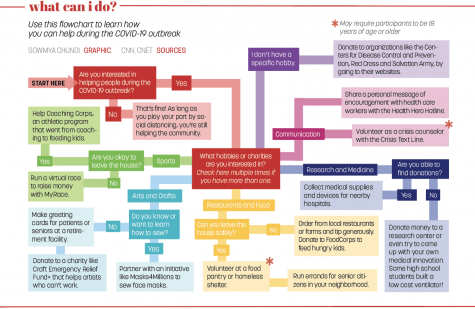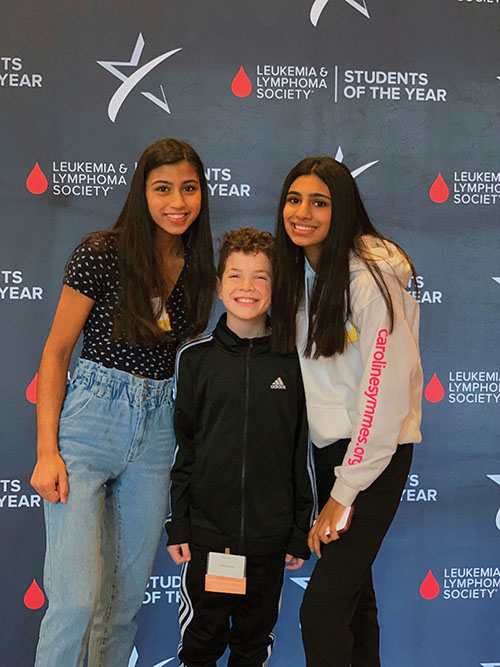Prior to the spread of COVID-19 in the United States, Janvi Bhatia, Carmel Health Occupations Students of America (HOSA) activities co-chair and junior, said she frequently volunteered at hospitals. However, since the first restrictions were imposed, Bhatia has been unable to physically volunteer there. This, however, has not stopped her from helping.
“I volunteered at Community Health Network for about two and a half years, but once (the) COVID-19 stuff started, volunteers were restricted from coming to the hospital; however, I’ve been able to help in different ways by making face masks with other HOSA members,” Bhatia said.
According to Bhatia, HOSA is an international student organization geared toward promoting career opportunities in the healthcare industry, and she thought it would be an ideal group to target for this project.
“Part of HOSA’s goal is to help with community service,” Bhatia said. “So with this pandemic we’ve been able to redirect community service to also help with that. With our project, we’ve seen some people make any number of face masks from three to 130, and it’s really great to see so many people help contribute to solve this issue.”
Bhatia is not the only one who has been taking initiative. Nicole Segaran, student group coordinator for Amnesty International and senior, said she has been using her position in the Carmel chapter of the international organization to spark conversation and encourage positivity.
“The purpose of Amnesty International in general is to promote human rights across the globe, so we’ve been interpreting that as how to bring up more of these conversations in the community in a non-partisan, healthy environment,” Segaran said. “There are a lot of human rights issues that have really come to life during this pandemic. For example, (Chinese) censorship has become an even bigger problem during this pandemic as it has stopped the flow of information to other governments. We need to be taking steps to continue these conversations with this pandemic.”
All of the initiatives both Bhatia and Segaran have taken in light of this crisis are known as “prosocial behavior.”
According to William Graziano, a professor in the Department of Psychological Sciences at Purdue University, prosocial behavior is behavior motivated to bring benefits to other people or to oneself.
“It can take many forms including cooperation, gratitude, volunteering, tolerating and working to bring benefits to others,” Graziano said.
Despite Bhatia and Segaran consistently helping the community even before the COVID-19 crisis, both said they have observed others expressing more prosocial behavior since the pandemic.
“It’s interesting to see how many more people are reaching out and becoming a lot more thankful during this time,” Bhatia said. “I’ve had friends reach out and be like, ‘Thank you for what you’re doing,’ and I think that it’s great, especially for those who express their gratitude to physicians and doctors.”
The observations of people becoming more prosocial is not locally specific. Rather, this is a trend that has been observed globally.
According to a study published in Nature Research, prosocial behavior has increased over the span of COVID-19’s spread. People are very much willing to stay at home to flatten the curve in order to keep themselves safe; when the motivation becomes the protection of others more vulnerable than themselves, that willingness appears to increase.
Graziano said the sudden increase in prosocial behavior given the current situation is not uncalled for or a coincidence.
“One of the things we know about prosocial behavior is that it waits to be activated, so when the circumstances are right, it can be provoked,” he said. “In this case, COVID-19 is the circumstance that motivated others to be more prosocial and caused such an increase in that trend.”
But with the crisis acting as a catalyst to promote more prosocial behavior, Bhatia wonders whether people will continue to contribute to the community even after the crisis comes to an end.
“I just wish that people don’t stop what they are doing once this is over,” Bhatia said. “The stuff you are doing to help the community now transfers over once this is over and with that, we can be stronger than ever.”
Graziano said he feels similarly; however, he said he thinks there is a way to prevent people from losing motivation once the crisis is over.
“As a professor, I think we would be able to promote more prosocial behavior even after the external motivation is removed by teaching it,” Graziano said. “It’s not taught all around, and many tend to know its opposite antisocial behavior much more than prosocial behavior, so by informing the public sphere about it, we will promote more actions like it.”
Click here to read about students exhibiting prosocial behavior during National Philanthropy day.


































![AI in films like "The Brutalist" is convenient, but shouldn’t take priority [opinion]](https://hilite.org/wp-content/uploads/2025/02/catherine-cover-1200x471.jpg)








































![Review: “The Immortal Soul Salvage Yard:” A criminally underrated poetry collection [MUSE]](https://hilite.org/wp-content/uploads/2025/03/71cju6TvqmL._AC_UF10001000_QL80_.jpg)
![Review: "Dog Man" is Unapologetically Chaotic [MUSE]](https://hilite.org/wp-content/uploads/2025/03/dogman-1200x700.jpg)
![Review: "Ne Zha 2": The WeChat family reunion I didn’t know I needed [MUSE]](https://hilite.org/wp-content/uploads/2025/03/unnamed-4.png)
![Review in Print: Maripaz Villar brings a delightfully unique style to the world of WEBTOON [MUSE]](https://hilite.org/wp-content/uploads/2023/12/maripazcover-1200x960.jpg)
![Review: “The Sword of Kaigen” is a masterpiece [MUSE]](https://hilite.org/wp-content/uploads/2023/11/Screenshot-2023-11-26-201051.png)
![Review: Gateron Oil Kings, great linear switches, okay price [MUSE]](https://hilite.org/wp-content/uploads/2023/11/Screenshot-2023-11-26-200553.png)
![Review: “A Haunting in Venice” is a significant improvement from other Agatha Christie adaptations [MUSE]](https://hilite.org/wp-content/uploads/2023/11/e7ee2938a6d422669771bce6d8088521.jpg)
![Review: A Thanksgiving story from elementary school, still just as interesting [MUSE]](https://hilite.org/wp-content/uploads/2023/11/Screenshot-2023-11-26-195514-987x1200.png)
![Review: "When I Fly Towards You", cute, uplifting youth drama [MUSE]](https://hilite.org/wp-content/uploads/2023/09/When-I-Fly-Towards-You-Chinese-drama.png)
![Postcards from Muse: Hawaii Travel Diary [MUSE]](https://hilite.org/wp-content/uploads/2023/09/My-project-1-1200x1200.jpg)
![Review: "Ladybug & Cat Noir: The Movie," departure from original show [MUSE]](https://hilite.org/wp-content/uploads/2023/09/Ladybug__Cat_Noir_-_The_Movie_poster.jpg)
![Review in Print: "Hidden Love" is the cute, uplifting drama everyone needs [MUSE]](https://hilite.org/wp-content/uploads/2023/09/hiddenlovecover-e1693597208225-1030x1200.png)
![Review in Print: "Heartstopper" is the heartwarming queer romance we all need [MUSE]](https://hilite.org/wp-content/uploads/2023/08/museheartstoppercover-1200x654.png)




